Beijing Lawmaker Lobbies For Free Abortion For College Students

While U.S. politicians and judges tangle over insurance coverage for contraception and abortion, a Chinese lawmaker is calling for making affordable — if not free — abortions available to college students, in a push to get young women with limited funds to use legitimate hospitals instead of resorting to unlicensed clinics.
According to the South China Morning Post of Hong Kong, college and high school-aged females represent a large share of China’s abortions, and many of them resort to unsafe and unhealthy unlicensed clinics to save on money. State-run China National Radio reported last year that about 13 million abortions are carried out annually, and half of the patients were under the age of 25.
The cost of a legal abortion in China can vary according to the stage of the pregnancy and other complicating factors, but typically runs from less than 500 yuan, roughly $82, to 1,000 yuan. At unlicensed hospitals, the procedure can be several hundred yuan cheaper.
Wei Aimin, a deputy in the Beijing People’s Congress, told Beijing’s Morning Post that many students turn to underground facilities to avoid having to ask parents or teachers for money to get abortions at legitimate hospitals. “All public hospitals in the city should offer abortions to pregnant students for free or for a minimal charge of 100 yuan so they are not forced to go to cheaper unlicensed clinics,” Wei said.
Wei also is pushing for preventing unwanted pregnancies by offering more sex education in schools, particularly ahead of winter and summer holidays, when many abortions happen. “The pregnant girls deserve public care,” Wei said. “Parents, society and government should help them to solve their difficulties in a collective effort.”
Some others think the issue should be addressed long before pregnancy, in the classroom. “The proposal that all public hospitals reduce charges could serve as a double-edged sword,” Li Yinhe, an outspoken sociologist and sexual behavior researcher, told the South China Morning Post. Li’s concern is that making abortions more affordable and accessible could inadvertently promote unprotected sex and drive up abortion rates. “The most important issue at present is to continue promoting sexual education in schools,” said Li, who has long advocated for improved sex education in schools. “Our education authority is largely responsible for the high number of unexpected pregnancies among students.”
© Copyright IBTimes 2024. All rights reserved.












